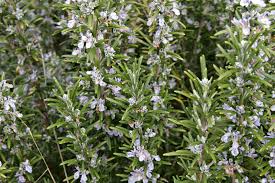Rosemary (Rosmarinus officinalis) is a woody, evergreen herb with needle-like leaves and bright fragrance – colored flowers (white, pink, purple or blue). Rosemary is a member of the Lamiaceae mint family, which also includes other herbs. It took its name from the Latin Proerchertai Rosmarinus, which means “sea drop”. Its flowering period is prolonged and gradual (from April to August).
Although a typical Mediterranean herb, rosemary grows in many temperate regions of Europe and America. It represents one of the most famous scents throughout Greece. Indeed, you can find rosemary in many dishes, adorning gardens with its lush and small foliage and almost at every mountain throughout whole Greece. The fresh and dried leaves of rosemary are used in traditional Mediterranean cuisine as herbs, for their intense acrid and bitter taste, which in turn complements chicken, lamb, pork, tuna dishes and various soups and sauces. Rosemary leaves give a distinct mustard smell when burned and thus they are widely used in cooking. Nevertheless, rosemary leaves can be boiled to create a healthy beverage.
Ingredients
Rosemary is very rich in plant iron, calcium and vitamin B6 and is also a good source of fiber. Fresh rosemary contains 25% more magnesium (lost somewhat during drying process) and 40% less calcium and iron compared with the dried, probably due to the higher percentage of moisture. Moreover, it is not regarded as a common food allergen and does not contain measurable amounts of oxalates or purines .
The remembrance…
Rosemary is known as a natural medicine since ancient times, as it is considered to strengthen and activate memory procedures, a belief that goes on till today. In ancient Greece, students put rosemary flowers among their hair when studying for exams, while mourners threw rosemary into the grave as a symbol of eternal memory. In ancient England, rosemary’s ability to enhance memory turned into a symbol of loyalty and played an important role to costumes, decorations and wedding gifts. Rosemary oil was distilled for the first time in the 14th century and later on used for the preparation of the very popular fragrance “Queen of Hungary’s Water”. During 16th and 17th century it became popular as digestion aid.
Pharmaceutical action
Rosemary contains substances that stimulate the immune system, increase blood circulation and improve the digestive process. It also contains anti-inflammatory agents that can contribute in alleviating asthma episodes. Rosemary is believed to increase the brain blood circulation, thus improving concentration. A recent research suggests that rosemary may actually improve memory, although accompanied by delayed recall. A second study shows that carnosic acid – contained in rosemary – protects the brain from free radicals, thereby reducing the risk of a stroke and neurodegenerative diseases such as Alzheimer’s and Gehrig disease. Yet, latest research and previous publications confirm the role of rosemary in the metabolism of carbohydrates and lipids in our body and indicate that rosemary may serve as a potential hypoglycemic and hypolipidemic agent. Rosemary has been also tested to help control weight. Studies in mice have shown that incorporating rosemary in a diet rich in fat can reduce body weight more than 60%, compared to animals fed with only a high fat diet.
Rosemary Oil
Rosemary oil is rich in phenolic compounds such as phenolic acids and flavonoids, while it is used in the food and cosmetics industry, and in aromatherapy. The rosemary decoction fights off diarrhea and hair loss and is also used for reducing weakness, headache, cold symptoms, exhaustion and depression. Finally, rosemary oil is recommended for stomach cramps, bloating and poor appetite. It displays antimicrobial action and until the early 20th century, rosemary oil was used as an antiseptic in French hospitals.
Specifically, clinical surveys found that a minimum concentration of essential oil of rosemary was capable of halting the growth of various pathogens such as E. Coli. Moreover, it destroys bacteria, since it is found to inhibit six microorganisms that infect and alter meat composition. Rosemary oil also exhibits antifungal action since it partially inhibits the growth and toxin production by various fungi.
Dosage
Like all herbs, rosemary is generally safe in culinary or therapeutic doses, although caution is advised to those who suffer from allergies or seizures. The rosemary oil is potentially toxic if ingested, while large quantities of leaves can have side effects (coma, convulsions, vomiting and pulmonary edema). It is recommended to avoid consumption of large quantities by pregnant or lactating women.
Conclusion
So, the next time you want to enhance the flavor of your dish, use rosemary leaves in cooking. There are many famous recipes using rosemary, regarding bread, beef, lamb, game, fish, seafood, omelets, soups, sauces and vegetables. By doing this you will reach an equally exquisite taste by making a wise –and above all- healthy choice















{ 0 comments… add one now }